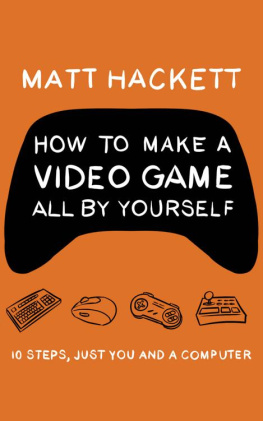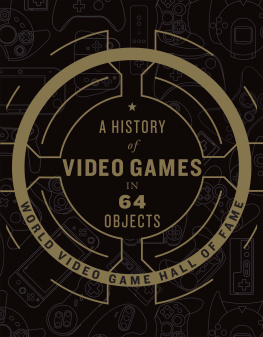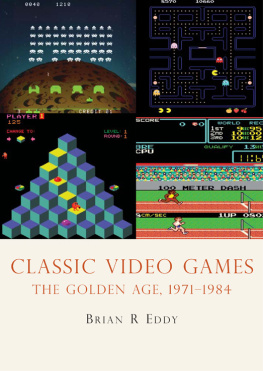This edition first published in hardcover in the United States in 2018 by
The Overlook Press, Peter Mayer Publishers, Inc.
NEW YORK
141 Wooster Street
New York, NY 10012
www.overlookpress.com
For bulk and special sales, please contact
or write to us at the above address.
Copyright 2018 by Alex Rubens
All rights reserved. No part of this publication may be reproduced or transmitted in any form or by any means, electronic or mechanical, including photocopy, recording, or any information storage and retrieval system now known or to be invented, without permission in writing from the publisher, except by a reviewer who wishes to quote brief passages in connection with a review written for inclusion in a magazine, newspaper, or broadcast.
ISBN 978-1-4683-1645-2

With 18 color photographs
BEFORE CALL OF DUTY, before World of Warcraft, before even Super Mario Bros., the video game industry exploded in the late 1970s with the advent of the video arcade. Leading the charge was Atari Inc., the creator of the iconic game Missile Command. The first game to double as a commentary on culture, it put players fingers on the button, making them responsible for the fate of civilization in a no-win scenario. The game was marvel of modern culture, helping usher in both the age of the video game and the gamer lifestyle.
In 8-Bit Apocalypse: The Untold Story of Ataris Missile Command, tech insider and writer Alex Rubens interviews numerous major figures from this time: Nolan Bushnell, founder of Atari; David Theurer, the creator of Missile Command; and Phil Klemmer, writer for the NBC series Chuck who wrote an entire episode for the show about Missile Command and its mythical kill screen.
Rubens delves into electronic history to tell of an era before massive development teams and worship of tech giants like Steve Jobs, when arcade games were designed, written, and coded by individual designers. As earnings entered the millions, these creators were celebrated as geniuses in their time; once dismissed as nerds and fanatics, they were now being interviewed for major publications and partied like Wall Street traders. However, the toll on these programmers was high: developers worked 120-hour weeks, often opting to stay in the office for days on end while under a deadline.
Taking readers back to the days of TaB cola, dot matrix printers, and digging through the couch for just one more quarter, 8-Bit Apocalypse combines Rubenss knowledge of the tech industry and experience as a gaming journalist to conjure the wild silicon frontier of the 80s.
For my wife, Sydnee.
In nuclear war, all men are cremated equal.
D EXTER G ORDON
W HEN IT COMES TO EARLY GAME DEVELOPMENT , YOU HEAR A couple of different stories over and over again. Either it was an incredibly serious crew of people busting out some masterpiece of programming in their garage or it was driven by bong rips and hot tubs. Actually, sometimes it seems like most video games of the late 1970s and early 1980s are the result of a bit of both. Thats what makes Dave Theurers story so significant. The development of Missile Command was decidedly different than the other games of its era. Its the first example of a games concept being ripped from the headlines, deliberately conceived to reflect the low-key panic of the Cold War in ways that, these days, might seem a little crude. But upon reading Alexs reporting here and trying to put myself in the shoes of Theurer as he attempts to create what might be the very first video game with a message, its easy to see just how overwhelming this process could be.
Of course, I didnt receive any part of Theurers message at first. I was five when Missile Command was completed and sent off to arcades, and the main message I received was you are too young to handle a game with this high-precision trackball and three separate fire buttons. I mostly stared at the cabinet as other people played because the flashing, cycling explosions that mark a players demise were some of the coolest-looking things in video games back then. Then Id go off to play Galaxian or shake my head at the massive line of people waiting for their chance to play Pac-Man.
I connected with Missile Command when it came home. My parents, thinking that computers might be good for education, picked up an Atari 400 and before long, I had a home version of Missile Command at the ready. Here, the trackball was replaced by a standard joystick, and instead of having to deal with three separate missile bases, there was only one base and one fire button. I got pretty good, but it never really translated into any real skill at the arcade version.
Over the years, Missile Command remained a respected arcade game. A lot of games started getting remade or remastered in newer ways. A few attempts were made at making new versions of Missile Command, but they were universally lame. Attempts to reissue the original game were usually hamstrung by the lack of a good trackball-style control option, making it harder to appreciate these days. Also, the timing was all wrong. We were in a different era, and remakes released in a time where thoughts of nuclear destruction were firmly on the back burner could never resonate the way the game did in 1980. In the twenty-three years Ive spent covering games, the ones that attempted to re-create the gameplay of Missile Command never got it right. As a result, Missile Command didnt benefit from our long nostalgia boom the way franchises like Donkey Kong or Pac-Man have. It faded into the background as a classic that modern players wouldnt really have a chance to connect with. I never spent much time thinking about it until the day a Missile Command arcade cabinet showed up on my doorstep. Someone was actually trying to throw it away, and we were able to rescue it just before it found its way into a landfill for good.
Of course, the cabinet didnt actually work.
Im no electronics wizard, but I can certainly blow dust, gunk, and spiders out of the inside of an arcade machine. After a thorough wipe down and some time spent carefully tapping the ROMs in the hopes that they just needed to be reseated into the PCB a bit, I lucked out. The machine fired up. Sure, the speakers were blown out and the monitor wasnt emitting an especially clean signal, but it was still playable. Adding to the overall appeal of having one in my home is that it also happens to be a uniquely beautiful cabinet. The side art has a chunky, colorful style to it that evokes the era quite well. Its also slightly shorter than a lot of other cabinets from the old days, which is something youll learn more about later on in the book. My Missile Command cabinet still needs some work, but even with a monitor that desperately needs servicing and blown-out speakers, Missile Commands colorful graphics and fast action are bright enough to blast through nearly forty years of dust and decay. Its a fantastic cabinet. Im also happy to report Ive finally gained enough dexterity to handle all three missile bases at the same time without panicking.
Im also old enough now to see what Theurer was going for, and a how a game that might seem so abstract by todays standards could haunt a person so thoroughly during its development. With todays political climate bringing back some of those Cold War feelings from the bad old days and an increasing focus on labor issues and the crunch culture that is burning out some of modern game developments brightest minds, Alex has chosen a fascinating time to look back at a game that dealt with those issues nearly forty years ago. I hope you get at least as much out of this look back at those early days as I did.








